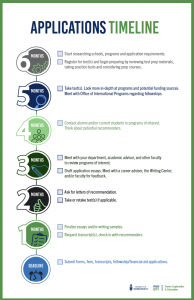Should I apply? How do I apply? When do I apply?

Deciding to apply for further education is a deeply personal choice, influenced by various factors. It involves a mix of personal reflection, networking, and thorough research. Here, we'll explore three fundamental questions:
- Should I Apply
- How to Apply
- When to Apply
Let's navigate together, focusing on your goals and community support.
Want to dig a bit deeper? Try these activities and tools:
1. Should I Apply
Deciding whether to pursue further education is a significant step that requires a thorough understanding of your career goals and the demands of your chosen field. Reflect on your career aspirations and research the standard qualifications required in your field.
- Does the career you are pursuing require further education?
- Will advancing your current career require specialized qualifications?
- Do you have a passion or interest in a particular subject and wish to gain additional expertise?
- Do you have financial resources to devote to further education?
- What are your goals at the end of this period of study?
It can be really helpful to networking with professionals and alumni from programs you are interested in. Try reaching out to current students in programs you are interested in or connecting alumni on LinkedIn - here are Tips for Informational Interviews
The Further Education Module is a great place to start thinking and planning for further education applications. It comprises seven mini-modules, each requiring only 5-10 minutes; this resource is flexible. You can start at any module and return to others as needed, making it a versatile tool for busy students. It has resources to help you understand application timelines and processes and reflect on your own strengths and needs. Explore the entire module or focus on just the sections that resonate with you.
2. How to Apply
The application process for further education typically involves gathering detailed documentation, such as transcripts, letters of recommendation, a resume or CV, and an essay or written statement.
- Carefully review the application requirements of each program you wish to apply to, as they can vary significantly.
- Organizing application timelines
- Get support from the writing centre to review your written statement.
- Ask for references early.
To keep organized as you research and apply to different programs, use this Application Tracking Sheet
For more details on how to apply, review:
- Further Education module
- Videos (Further Education advice)
- Career Resource Library (Further Education section)
3. When do I Apply
Timing your application for further education varies depending on the program and your personal circumstances.
Most graduate programs have due dates as early as a year before the start date, with some professional schools offering rolling admissions that begin even earlier.
Researching early is crucial as it allows you to prepare thoroughly, fulfilling various prerequisites and gathering necessary documents or test scores. Engaging with career advisors at your current institution can also provide strategic insights into the best timing for applications to align with your career trajectory.

Researching early is crucial as it allows you to prepare thoroughly, fulfilling various prerequisites and gathering necessary documents or test scores. Engaging with career advisors at your current institution can also provide strategic insights into the best timing for applications to align with your career trajectory
Use this Timeline(PDF) to help plan ahead.
Gathering more information on further education?
Check out these Career Start links about further education:
